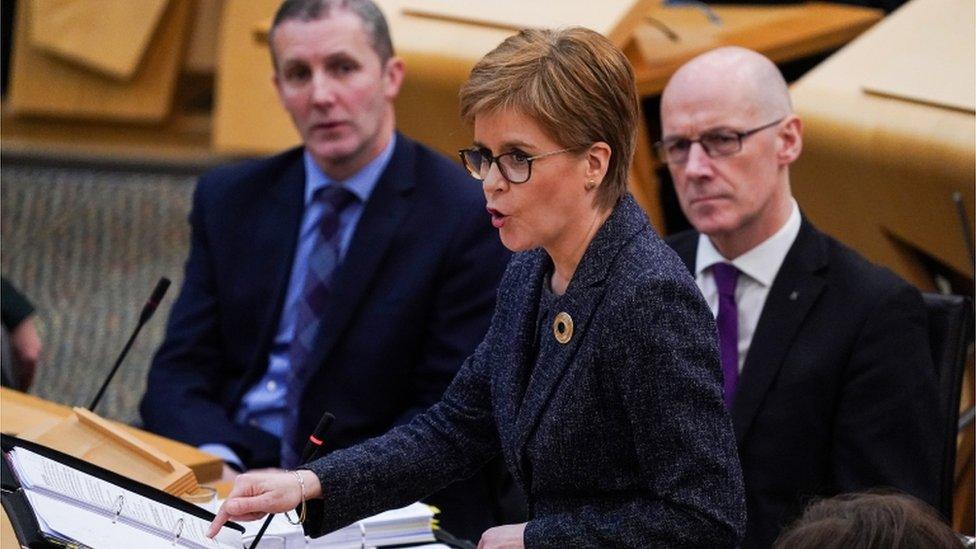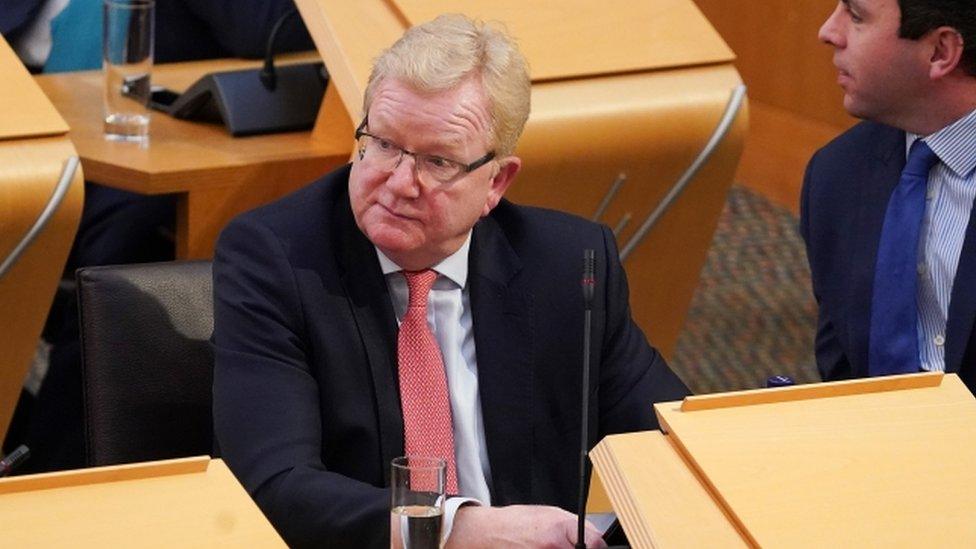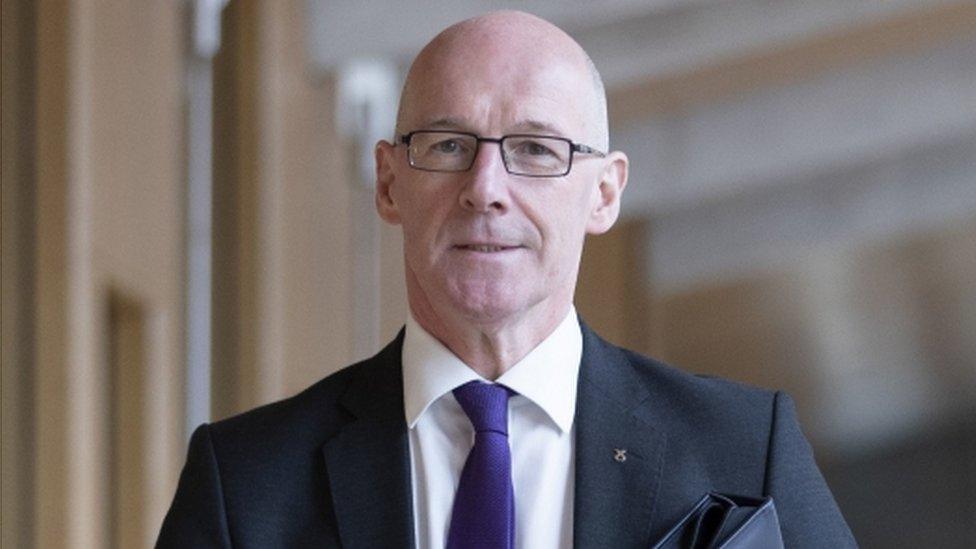FMQs: Attention returns to devolved issues
- Published

To govern is to choose. But, before ascending to that state, democratic governments have to face another choice. That of the electorate. To elect is to choose, literally.
Remarkable things, elections. They can be used to select councillors or Parliamentarians. They can be used to determine future governance.
Or, as today at Holyrood, they can be deployed to help deflect some awkward questions from rivals. We know now that Brexit is over - c'mon, it must be true, Adam Tomkins of the Conservatives said so in the chamber yesterday.
Anyway, now that Brexit is sorted - okay, okay, I hear you - attention will revert to domestic devolved matters.
At Holyrood today, these included the Scottish government's record on education, care provision, bus and air travel.
Throughout the discussions, Nicola Sturgeon referred frequently to the most recent electoral exercise, that of the UK general election last month.
Stretching things
She told sundry opposition MSPs that their complaints were groundless - because the Scottish government's record had been put before the people in December and had been warmly endorsed.
That strikes me as stretching things just a mite. For one thing, this was a Westminster election, not a Holyrood contest.
For another, it was utterly dominated by the topic of Brexit - not Scottish education, care, travel or any other devolved responsibility.
For yet another, the SNP offer in that election focused upon a range of topics - such as blocking Brexit, keeping Boris Johnson out of Downing street and restating the prospect of a further referendum on independence.
Now, it is also to be proclaimed as a gold star for Scottish Ministers. To repeat, I think that is stretching things just a tad.
However, let me be charitable. This is a New Year after all (may you all have a guid yin.) A new decade indeed. Further, today is my birthday and Dundee United are stretching their lead at the top of the league. (OK, it's still the wrong league - give us a chance.)
So, let me say that Nicola Sturgeon is entitled to derive satisfaction from a successful election for her party.
She is also entitled to suggest that a period of relative silence might be welcome from her critics, given that their parties all lost ground in Scotland. But, perhaps, she shouldn't push the point too far. I feel sure she won't.

On the day, the exchanges varied from robust to substantive to empathetic. Jackson Carlaw, the interim Tory leader who now wants the job permanently, had a go at his standfast topic, Scottish educational standards.
He rose, full of vim, ready to chide Education Secretary John Swinney for his "secret" review of Higher exam marks in Scotland.
Did Mr Swinney bow his head, rumbled? Did Ms Sturgeon offer a general apology to Scotland's pupils, parents and teachers?
Friends, they did not. Rather Ms Sturgeon confirmed that her deputy's conspiracy of silence had been broken. His cover had indeed been blown.
And who was the mole? Well, it was Swinney, J. The education secretary had written, in public, to parliament's own education committee, advising them of his intention to review the Highers (where performance slipped.)
With a faintly acidic tone, Ms Sturgeon advised her interlocutor that he might usefully do his homework before launching accusations in the media and the chamber.

Nothing daunted, Mr Carlaw persisted on the broader topic. But, somehow, the spark had gone out of the encounter.
On to care provision. Labour's Richard Leonard questioned Ms Sturgeon, rather effectively, about care services in South Lanarkshire.
With sharper bite still, Alex Cole-Hamilton of the Liberal Democrats raised an individual - and seemingly shocking - case affecting one of his Edinburgh constituents.
This was all very tricky ground for Ms Sturgeon. We are dealing here with some of the most needy and vulnerable citizens in Scotland. Almost every family will, ultimately, have experience of care provision, whether positive or otherwise.
Ms Sturgeon stepped carefully, most notably in response to the Edinburgh example. She offered sympathy and apologies, while stressing that care services generally had been supported by her government.
Next, to travel. Patrick Harvie of the Greens urged greater public provision of bus services. Ms Sturgeon responded imprecisely but empathetically (ministers might well need the Greens to get their budget through.)
And Willie Rennie of the Lib Dems soared to heights of rhetoric as he questioned how the Scottish government's campaign to counter climate change sat with their support, as yet still extant, for the expansion of Heathrow Airport.
Ms Sturgeon tried a range of responses - or at least she did after the presiding officer was reminded, by a gentle clerical nudge, to call Mr Rennie for a supplementary.
The SNP at Westminster had voted against Heathrow. All policies, including Heathrow, were under climate review - and that might mean some tough decisions. However, if Heathrow expansion went ahead, Scotland could not be left in the slow lane.
It was all a bit multi-faceted for Mr Rennie, who looked less than impressed. But then that is what happens when ministers are in the middle of a review process, rather than at its close. Welcome to government.
